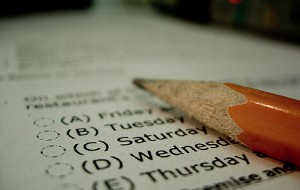South Florida State House Candidates Agree There’s Too Much Testing

shinealight / Flickr
Republican, Democrat and independent candidates were unanimous Tuesday -- Florida schools test too much.
The candidates running for three South Dade state House seats — Republican, Democrat, independent — all agree that Florida students and schools spend too much time testing.
Candidates running for the Florida House of Representatives in the 112th, 114th and 115th districts gathered for an education forum Tuesday night at Palmetto Middle School.
“The biggest problem that the assessment process has right now,” said Rep. Erik Fresen, a Republican who represents the 114th district and is chairman of the House Education Appropriations subcommittee, “we have a completely twisted form of actually executing the assessments. Assessments end up drowning the school.”
His challengers, Democrat Daisy Baez and independent Ross Hancock both agreed: There’s too much testing and teachers must adjust their plans and lessons to prepare students for those exams.
In the 115th district, Republican incumbent Mike Bileca and Democratic opponent Kris Decossard agreed. So did Democratic Rep. Jose Javier Rodriquez, who represents the 112th district. His opponent did not participate.
Tuesday’s forum was the latest sign that the political tide has turned against the testing requirements of Florida education policy and local school school districts.
 Both candidates for governor want to scale back testing — though Democrat Charlie Crist more so than Republican Gov. Rick Scott.
Both candidates for governor want to scale back testing — though Democrat Charlie Crist more so than Republican Gov. Rick Scott.
Statewide superintendent and school board groups have called for less testing and to pause school grades so teachers and students can adapt to new math and language arts standards and accompanying tests.
And the education group founded by former Gov. Jeb Bush — who pioneered the widespread use of testing to judge school performance — wants fewer, but better tests.
“It’s how it’s used that’s most important,” Bileca said of testing. “If it’s used as a way to look for opportunities to educate the child, develop their strengths, help compensate for their weaknesses, then it’s very valuable. If it’s used in a way that’s punitive, then it’s not.”
Fresen said lawmakers plan to pare down the number of tests when they meet next year.
The question is how far lawmakers want to go to reduce testing or its use in determining which students advance or graduate, grades for public schools and teacher evaluation scores. When state leaders talk about testing, they often only are speaking about tests required by local school districts. But many parents and local leaders are most worried about state tests and how the results are used.
But as one person at the forum noted, Fresen and Bileca were opposed to the amount of testing. But both those lawmakers voted for the Student Success Act in 2011. That law requires teachers are evaluated based, in part, on student test scores and that students must take a final exam for every course.